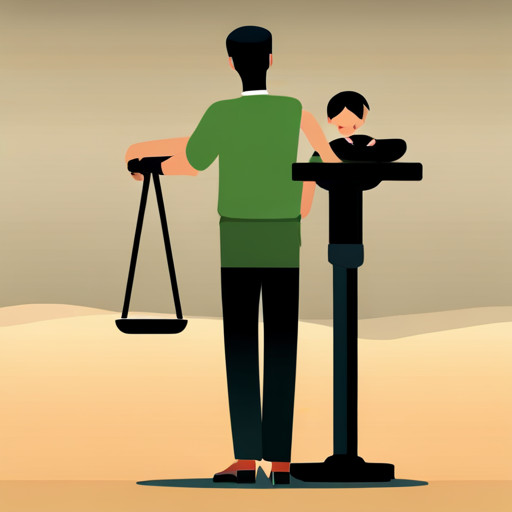Are you wondering if you, as a child, are responsible for your parents’ debt? Well, the answer isn’t as straightforward as you might think. In this article, we will explore the legal responsibilities and obligations that children may or may not have when it comes to their parents’ debts. Additionally, we’ll delve into the moral considerations and family dynamics that can influence these situations.
When it comes to legal responsibilities and obligations regarding your parents’ debt, it’s important to understand that in most cases, children are not held directly liable for their parents’ financial obligations. However, there are some exceptions to this rule. For instance, if you have co-signed a loan with your parent or become a joint account holder on their credit card, then you could be responsible for those specific debts. It’s crucial to be aware of any agreements or contracts you have entered into with your parents that could potentially make you financially accountable. Stay tuned as we discuss more about the intricacies of these circumstances and how they play out in different scenarios.
Key Takeaways
– Children are generally not held directly liable for their parents’ debts, unless they have co-signed a loan or become joint account holders on their parents’ credit cards.
– Inheriting assets with outstanding loans or debts attached to them can make children liable for their parents’ debts.
– Legal responsibilities and obligations regarding parents’ debts can be complex and vary depending on the circumstances.
– While children may not have legal obligations, moral considerations often prompt them to take on the burden of their parents’ debts willingly.
Legal Responsibilities and Obligations

Do children bear the burden of their parents’ debts? The answer to this question depends on various factors, including legal responsibilities and obligations. In most cases, children are not directly responsible for their parents’ debts. However, there are certain situations where they might be held accountable.
One common scenario where children may become responsible for their parents’ debts is when they co-sign a loan or credit card agreement. By doing so, they agree to share the responsibility for repaying the debt. If their parent defaults on the payments, the creditor can pursue collections from both the parent and the child. It’s essential to carefully consider the implications before agreeing to co-sign any financial agreements with your parents.
Another situation where children may be held liable for their parents’ debts is if they inherit assets that have outstanding loans or debts attached to them. In some cases, creditors can make claims against these assets, which could potentially impact the inheritance received by the children. It’s important to consult with an attorney or financial advisor to understand your rights and obligations in such situations.
While children generally do not bear the burden of their parents’ debts, there are instances where they could become accountable. Co-signing loan agreements or inheriting assets with outstanding debt can expose them to potential liability. Understanding these legal responsibilities and obligations is crucial in navigating personal finances effectively. Moving forward into discussions about moral considerations and family dynamics surrounding parental debt provides a deeper understanding of this complex issue without skipping a beat.
Moral Considerations and Family Dynamics

While it may be amusing to think that family ties miraculously dissolve financial burdens, the weight of debt somehow remains unclaimed. When it comes to moral considerations and family dynamics, children often feel a sense of responsibility towards their parents’ debts. This sense of responsibility can stem from a deep-rooted value system that emphasizes taking care of family members in times of need. Children may feel morally obligated to support their parents because they have been raised with the belief that family should stick together through thick and thin.
Moreover, family dynamics play a crucial role in shaping children’s attitudes towards their parents’ debts. The bond between parents and children is usually characterized by love, trust, and mutual support. In many cases, this bond extends beyond just emotional support and encompasses financial responsibilities as well. Children may feel compelled to help their parents overcome their debts due to the strong emotional connection they share. They understand that supporting their parents during tough times can strengthen the family unit and foster a sense of unity.
While legal obligations may not hold children responsible for their parents’ debts, moral considerations and family dynamics often prompt them to take on this burden willingly. The values instilled in children from an early age can shape their attitudes towards familial responsibilities and encourage them to provide assistance when required. However, these moral obligations do not come without consequences as there are also financial implications involved.
Financial Implications and Burdens

Imagine the weight of financial implications and burdens that can be placed on you when faced with your family’s debts. It can be overwhelming to think about how your parents’ debt could affect your own financial future. You may find yourself worrying about whether you will have enough money for your own needs or if you will need to take on additional debt to help support them. The responsibility and pressure can feel suffocating at times, as you try to navigate the delicate balance between taking care of your own financial well-being and supporting your family.
As a child, it is important to remember that while you may feel a sense of obligation towards helping your parents, their debts are ultimately their responsibility. It is crucial to establish boundaries and have open conversations about finances within the family. This means discussing expectations, setting realistic goals, and exploring potential solutions together. Remember that finding a balanced approach to family and finances doesn’t mean sacrificing your own financial stability entirely; instead, it involves working towards a solution that benefits everyone involved without jeopardizing anyone’s future.
Navigating the financial implications of your parents’ debt can be challenging, but it is essential to prioritize self-care while also considering the well-being of your family. Taking steps such as seeking professional advice from financial planners or counselors can help provide guidance through this difficult situation. By finding a balanced approach where both you and your parents take responsibility for their debts without placing an undue burden solely on one party, you can create a path forward that ensures everyone’s needs are met while preserving personal financial stability for all involved—transitioning into the subsequent section about ‘finding a balanced approach to family and finances’.
Finding a Balanced Approach to Family and Finances

Finding a balanced approach to managing the financial needs of your family and maintaining your own stability can feel like walking a tightrope over a shark-infested pool. It’s important to understand that while you may have responsibilities towards your parents, taking on their debt should not come at the expense of your own financial well-being. Here are some tips to help you find a balanced approach:
– Communicate openly: Talk to your parents about their financial situation and understand the extent of their debt. This will allow you to make informed decisions about how much support you can provide without jeopardizing your own financial future.
– Set boundaries: While it’s natural to want to help your parents, it’s essential to establish clear boundaries. Determine what you are comfortable contributing financially and communicate these limits with both yourself and your parents.
– Explore alternative solutions: Instead of taking on all of your parents’ debt, consider exploring other options such as helping them create a budget, finding ways for them to increase their income, or assisting them in seeking professional financial advice.
– Prioritize savings: Building an emergency fund and saving for retirement should be top priorities for yourself. By ensuring that you have enough funds set aside for unexpected expenses and future needs, you will be better equipped to support both yourself and potentially assist your parents if necessary.
Remember, finding a balanced approach means weighing the needs of both yourself and your family members. Taking on all of your parents’ debt may not be feasible or sustainable in the long run. By communicating openly, setting boundaries, exploring alternatives, and prioritizing savings, you can navigate this challenging situation while still maintaining financial stability for yourself.
Frequently Asked Questions
Can parents legally transfer their debt to their children?
No, parents cannot legally transfer their debt to their children. Each individual is responsible for their own financial obligations, and children are not automatically liable for their parents’ debts.
Is there a statute of limitations on children being held responsible for their parents’ debt?
Yes, there is a statute of limitations on children being held responsible for their parents’ debt. For example, in some states, the limit may be 2-10 years from the date the debt was incurred.
Are there any situations where children can be held legally responsible for their parents’ debt?
Children can be held legally responsible for their parents’ debt in certain situations. For example, if they co-signed a loan or are named as a joint account holder, they may be liable for the debt.
What are the potential consequences for children who refuse to pay their parents’ debt?
Refusing to pay your parents’ debt? How dare you! Prepare for a world of fun like endless phone calls from creditors, wage garnishments, and a plummeting credit score. Enjoy the ride!
Are there any legal protections in place to prevent children from being burdened by their parents’ debt?
There are legal protections in place to prevent you from being burdened by your parents’ debt. These protections vary by jurisdiction, but they generally aim to ensure that children are not held responsible for their parents’ financial obligations.
Conclusion
In conclusion, when it comes to the question of whether children are responsible for their parents’ debt, it is essential to consider both legal obligations and moral considerations. Legally speaking, children are generally not held responsible for their parents’ debts unless they have willingly co-signed or guaranteed the debt. However, morally, there may be a sense of duty and responsibility to support one’s parents in times of financial need.
Furthermore, the financial implications and burdens that come with taking on a parent’s debt should not be taken lightly. It can have a significant impact on one’s own financial stability and future prospects. While family dynamics play a crucial role in decision-making, it is important to find a balanced approach that takes into account both familial responsibilities and personal financial well-being.
Ultimately, each situation is unique, and there is no one-size-fits-all answer to this complex question. It requires careful consideration of legal obligations, moral values, and individual circumstances. By finding a balance between supporting family members while also protecting one’s own financial future, individuals can navigate this challenging topic with wisdom and prudence.

